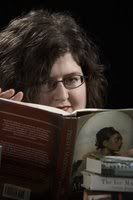 In the not-so-distant future, a deadly plague has rampaged through the world. The Blink begins with redness of the eyes causing an uncontrollable blinking response and kills its victims within hours. Within a short period it becomes water and airborne, killing millions of people almost instantaneously.
In the not-so-distant future, a deadly plague has rampaged through the world. The Blink begins with redness of the eyes causing an uncontrollable blinking response and kills its victims within hours. Within a short period it becomes water and airborne, killing millions of people almost instantaneously.In The City, inhabited by the recently departed, the effects of the plague are first felt as a onslaught of new arrivals. Suddenly people rapidly start disappearing and soon the exodus has disrupted the flow of The City. New arrivals, who used to stay an average 30 years until the last person remembering them dies, now move on within hours. Soon Luka Sims, the publisher of the only newspaper in The City believes himself to be the only remaining resident and wonders whom he knows who is still alive, until the day he finds the blind man. Together they explore the endless streets of The City, searching for the remaining tenants and with each new person found they piece together a puzzling truth – they are all still there because they know Laura Byrd.
Fighting her way across the frozen tundra to find a way to contact the outside world, Laura Byrd has no idea why her fellow scientists failed to return to their research station. She traces their steps to Ross Ice Shelf research station and finds it deserted. It is only then that she discovers she may the last person left alive.
In The Brief History of the Dead, Kevin Brockmeier takes these two streams of narrative and creates a novel which gains cohesion as the narratives begin to merge. The premise of The City, a step in the move to the afterlife, is fascinating. The novel as a whole is clearly a meditation on the power of memory and its resilience.
As Laura spends months in isolation and then in a fight to stay alive, her thoughts move from deliberate remembrances to free associations and fragmentary memories. At one point, a character in The City asks “how real are our memories” and this is clearly one of the central questions Brockmeier is addressing. Brockmeier’s writing suggests that he believes there to be a difference between the two types of memories; though he leaves it up to his readers to decide.
Laura’s fight for survival is compelling; however, Brockmeier’s writing is the strongest in the chapters set in The City. The voices of the dead resonate with readers and many deserved to be developed further. It is clear from the novel that the dead are aware that Laura may be the last person alive and when she dies, they may move on as well. The issue Brockmeier does not address (and one which may have strengthened the novel) is what emotions this pending departure inspires.
In an interview at Powells.com, Brockmeier states: “I was curious as I wrote the book about how those residents would react to the circumstances of their existence, what kind of relationships they would form, and what they would do when it came time for them to pass out of living memory.” He has accomplished the first part of this goal brilliantly; it is only his failure to explore of the second part of this goal which keeps The Brief History of the Dead from receiving 5 stars.
Read the review at Curled Up with a Good Book.
ISBN10: 1400095956
ISBN13: 9781400095957
Trade Paperback
272 Pages
Publisher: Vintage
Publication Date: January 9, 2007
tags: books book reviews apocalyptic fiction afterlife Kevin Brockmeier


No comments:
Post a Comment